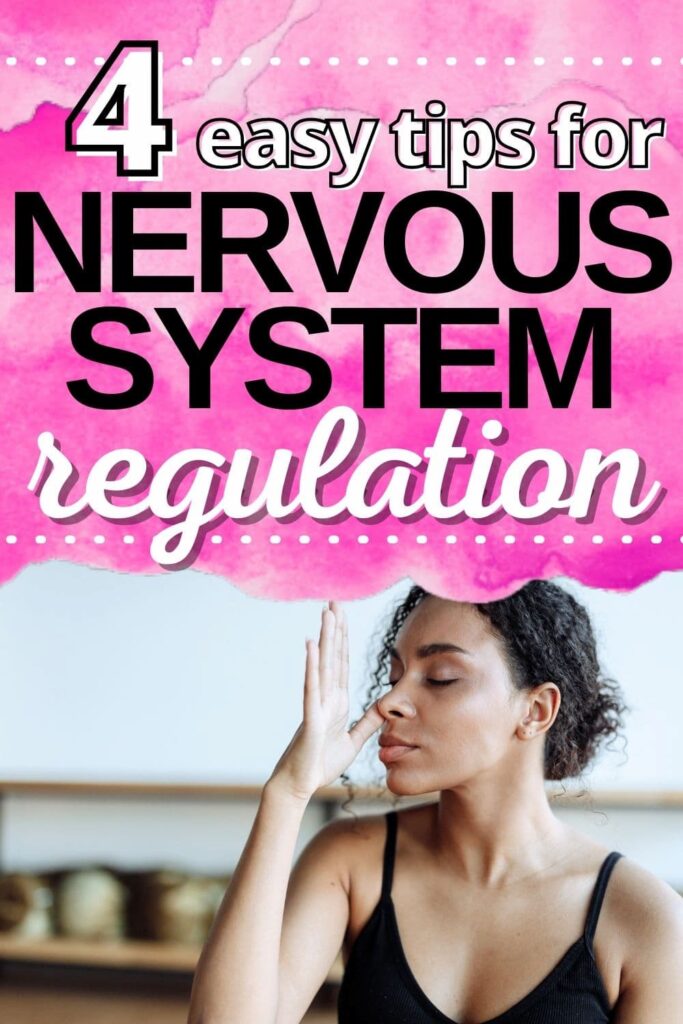The nervous system is a complex network of cells and organs that regulate the body’s functions and responses to external stimuli. It is responsible for controlling everything from breathing and heart rate to digestion and immune function. The nervous system works to maintain homeostasis or balance within the body.
In this article, we’ll go over the basics of nervous system regulation, including the roles of the sympathetic and parasympathetic nervous systems, and how they work together to maintain equilibrium in the body.

What is the Nervous System?
The nervous system is made up of the brain, spinal cord, and peripheral nerves.
The central nervous system (CNS) includes the brain and spinal cord, while the peripheral nervous system (PNS) consists of the nerves that extend from the CNS to other parts of the body.
The nervous system sends and receives messages throughout the body and controls its various functions.
What is the Autonomic Nervous System?
The autonomic nervous system (ANS) is the part of the nervous system that regulates involuntary processes, such as heart rate, breathing, digestion, and immune function.
The ANS has two main components: the sympathetic nervous system (SNS) and the parasympathetic nervous system (PNS).

The Sympathetic Nervous System
The SNS is responsible for the “fight or flight” response, which is switched on if there is a perceived threat or danger.
When the SNS takes over, it increases heart rate, breathing rate, and blood pressure, dilates pupils, and diverts blood flow away from the brain and digestive tract, and towards the muscles, preparing the body for action.
The Parasympathetic Nervous System
In contrast, the PNS is in charge of the “rest and digest” response, which is operating when the body is in a state of relaxation.
When the PNS is in charge, it decreases heart rate and breathing rate, constricts pupils, and increases blood flow to the digestive tract, promoting digestion and absorption.
How the Sympathetic and Parasympathetic Nervous Systems Work Together
The SNS and PNS work together to maintain balance in the body.
For example, when a person is under stress, the SNS is activated, increasing heart rate, breathing rate, and blood pressure.
However, once the threat has passed, the PNS is activated, reducing heart rate and breathing rate, and promoting relaxation.

Dysregulated Nervous System
When the nervous system is dysregulated, it can lead to various health problems, including
- anxiety
- depression
- digestive problems
- memory loss
- sleep disturbances
- chronic pain
- fatigue and many more!
Chronic stress of any kind can lead to dysregulation of the nervous system, causing it to be stuck in a constant state of alert, leading to physical and emotional exhaustion.

Regulating Your Nervous System
Fortunately, there are practical tools you can use to regulate your nervous system and promote a sense of calm.
- Deep breathing
Find yourself needing to feel calm? In this busy world, it can happen to all of us. Try taking a minute or two to breathe in and out slowly as this can lower the stress response, create a sense of peace, and even help lessen brain fog. - Regular exercise
Regularly moving your body can help improve the immune response, calm the nervous system, and reduce stress levels. Just be sure you don’t overdo it and include rest days too! - Engage in activities that bring joy
Listening to an upbeat song or spending time doing things you like to do can be very healing and often offer a sense of calm and relaxation which can be a great way to improve your emotional state. Did you know that your thoughts and emotions can actually change your body on a cellular level!?
The Role of the Vagus Nerve in Nervous System Regulation
The vagus nerve is a key player in nervous system regulation.
It is responsible for the activation of the PNS and the regulation of heart rate, digestion, and immune function.
The polyvagal theory suggests that the vagus nerve plays a critical role in the regulation of emotions, state of mind, and behavior.

Trauma and Nervous System Dysregulation
Trauma can have a profound impact on the nervous system, causing it to become dysregulated.
Trauma can occur from a single event, such as a car accident, or from prolonged exposure to stressful circumstances, such as abuse or neglect.
In response to trauma and stress, the nervous system can become stuck in a state of alarm, causing individuals to feel anxious, fearful, and on edge.
When the nervous system is dysregulated, it can impact various functions of the body, including the immune system, digestive system, and cardiovascular system.
Individuals who have experienced trauma may experience symptoms such as chronic pain, digestive problems, and memory loss, among others.
Practical Tools for Regulating the Nervous System
Fortunately, there are useful tools that you can use to balance your nervous system and manage stress.
These tips can help you feel calmer and more in control, even in a stressful situation.
Here are some examples:
Deep Breathing
A breathing practice is a simple yet powerful tool you can use anywhere to relax, get in touch with your feelings, control anxiety, or just help you rest.
By taking slow, deep breaths, individuals can activate the parasympathetic nervous system, which helps to promote relaxation and reduce stress.
To practice using your breath, find a comfortable position and breathe in slowly through your nose for a count of four.
Hold your breath for a count of seven, then exhale slowly through your mouth for a count of eight.
Repeat this cycle several times, and notice how you feel.
Exercise
Exercise is another effective way to help balance the nervous system.
When you exercise, your body releases endorphins, which are natural mood boosters.
Exercise also helps to reduce the levels of stress hormones in the body, such as cortisol and adrenaline.
To reap the benefits of exercise, aim for at least 30 minutes of moderate-intensity exercises, such as walking or jogging, most days of the week.
Relaxation Techniques
Relaxation techniques, such as meditation, yoga, and tai chi, can also be helpful for regulating the nervous system.
These practices help to promote relaxation and reduce stress, and they have been shown to have other numerous health benefits, including reducing anxiety and depression, improving sleep, and enhancing overall physical health.
Positive Distractions
Sometimes, the best way to regulate the nervous system is to engage in positive distractions. This can include activities such as listening to music, reading a book, or spending time in nature.
Positive distractions can help to shift your focus away from stressful situations and can help you feel more relaxed and grounded.

FAQs About Nervous System Regulation
Still not sure about dysregulated nervous systems and how it relates to healing. Here are a few common questions and answers that I hope will help 🙂
1. What can dysregulation of the nervous system lead to?
Dysregulation of the nervous system can lead o various health problems, including anxiety, despair, digestive issues, and cognitive issues. Chronic stress can also lead to dysregulation of the nervous system, causing it to be stuck in a constant state of alarm, leading to physical and emotional exhaustion.
2. What are some practical tools for regulating the nervous system?
Practical tools for regulating the nervous system include deep breathing, regular exercise, relaxation techniques such as meditation and yoga, and positive distractions such as listening to music or spending time in nature.
3. What is the role of the vagus nerve in nervous system regulation?
The vagus nerve is a key player in nervous system regulation. It is responsible for the activation of the PNS and the regulation of heart rate, digestion, and immune function.
4. Can trauma impact nervous system regulation?
Yes! Trauma can have a profound impact on the nervous system, causing it to become dysregulated. And it doesn’t have to be the kind of trauma many people traditionally associate with the word (war, severe physical abuse, or a terrible accident). While those types of trauma can absolutely be the cause of a dysregulated nervous system, so can any other trauma such as:
- an emergency or traumatic birth (or other medical trauma)
- living through a natural disaster
- a serious financial event or any other event that causes severe stress.
In response to stress and trauma, the nervous system can become stuck on high alert causing individuals to feel anxious, fearful, and on edge.
But don’t lose hope! If you’ve experienced trauma, you can absolutely retrain your brain, reduce or eliminate your symptoms, and find healing.
5. What are some benefits of deep breathing?
Using your breath can activate the parasympathetic nervous system, promoting relaxation and reducing stress. It can also help regulate heart rate, blood pressure, and digestion.
How can exercise help regulate the nervous system? Exercise can release endorphins, which are natural mood boosters. It also helps to reduce the levels of stress hormones in the body, such as cortisol and adrenaline and can improve overall physical health and well-being.

Last Thoughts…
The nervous system plays a key role in regulating the functions of the body, and when it becomes dysregulated, it can have a profound impact on physical and emotional health.
Fortunately, there are easy, useful tools you can use to regulate your nervous system and manage stress.
By incorporating deep breathing, exercise, relaxation techniques, and positive distractions into your daily routine, you can promote a state of calm and well-being, even in the midst of stressful life situations.
Remember, you have the power to regulate your nervous system and take control of your life.
Related Articles
- Brain Retraining and Neuroplasticity: Unlocking the Mind-Body Connection to Heal
- Nervous System Healing: A Nourishing And Restorative Approach
- Breathe Your Way to Healing: Unveiling the Power of Somatic Breathwork
- Discover the Power of Somatic Movement for Healing Trauma and Stress
- Easy Ways To Reduce Stress Naturally
- Delicious Adaptogenic Tea Blends For Balance And Stress Relief
- Cortisol: The Real Story Of This Misunderstood Hormone


